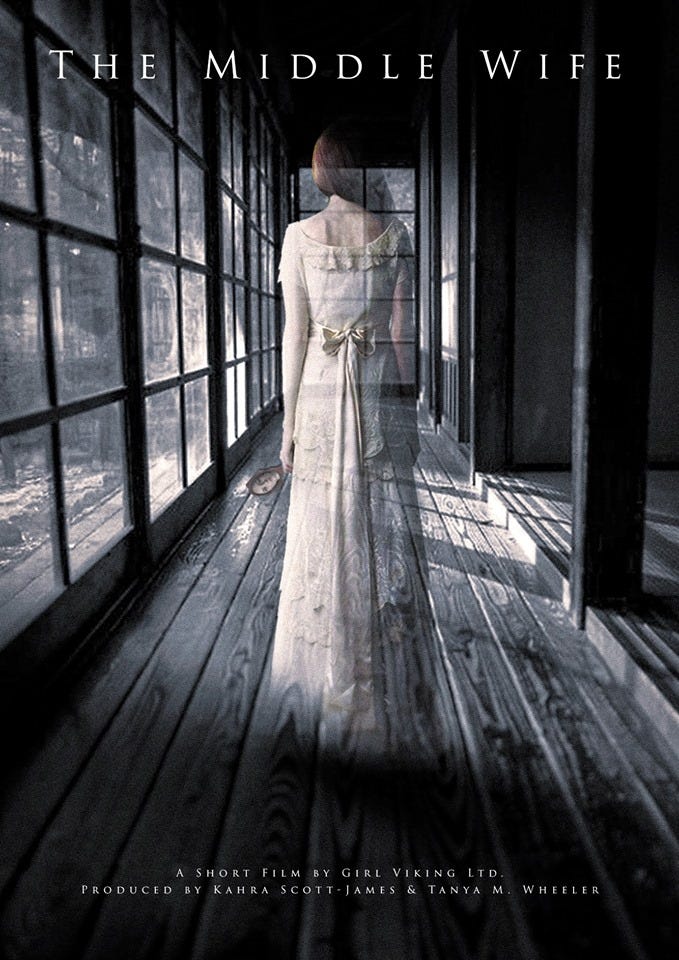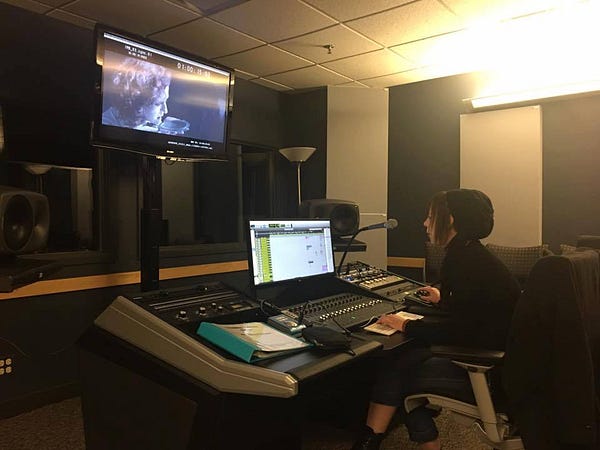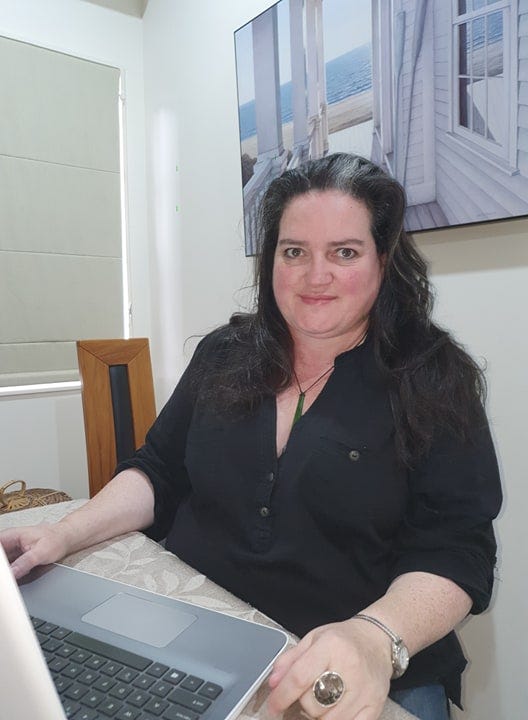
Kahra Scott-James and Tanya M. Wheeler are making an ambitious short film, The Middle Wife, described by an LA script consultant as ‘Northanger Abbey meets The Innocents’. It explores domestic violence. And they are crowd-funding on Boosted for its first stage.
I know Tanya as a prolific and deeply committed screenwriter, with credits on the short films Wrong and Footsteps, on Power Rangers, the feature Umbrella Man; and the award-winning RESET webseries, which she also produced.
And I’m learning about Kahra, a writer, a sound designer, re-recording mixer and occasional composer whose award-winning Trap screened at last year’s New Zealand International Film Festival (among many other festivals). She has designed soundtracks for 3D interactive movie creators Brilliant Digital Entertainment (USA/Australia — Warner Brothers/DC Comics), managed an audio post-production studio for several years, working on broadcast, film and animation projects and lectured in sound design and audio post production in New Zealand, Australia and Ireland. And she’s also working on a web series part funded by Google/Youtube and a digital feature film, an academic at De Paul University’s School of Cinematic Arts in Chicago and author of Sound Design for Moving Image, published last year.
 |
| Kahra at work |
When I read about The Middle Wife and that these two are working together, I invited Tanya to chat.
 |
| Tanya M Wheeler |
ME What inspired The Middle Wife?
Tanya M Wheeler It came from the story of a distant ancestor. Her death was so grisly that I imagined that she might have haunted the house afterwards. When I wrote it, I was thinking about the character and her anger and frustration at finding herself in the situation of being an unburied ghost. I wondered what determination she might have shown, as a ghost, to punish the killer, and what she would have wanted in order to pass over.
I want the audience to think about the optimism of the ending, where persistence pays off for the powerless battered wife. I also want them to think about the motto the short film espouses about domestic violence, ‘Get Help. Give Help.’ People are not alone, and that if they ask, people will help them.
It is important to encourage by-standers to offer judgement-free assistance before it is too late. People often worry about interfering or don’t know how to help, but being willing to listen or to be a safe space can sometimes be enough.
Kahra’s mother, Christine, worked in the Domestic Violence prevention sphere for many years and we wanted to make the point that this is not a new social issue, and that by now, almost 110 years after the year in which this short film is set, that we should be doing better and ending violence against women.
ME Why a short this time, when you both also work with longer narratives?
TMW This tale was so encapsulated that I felt it was best produced as a short film. The New Zealand Film Commission (NZFC) pathway towards features is usually paved with short films, so when I teamed up with Kahra, we both wanted to co-produce this as a short film, to test our producing partnership and because we have the same vision for the sound and strong visuals for this script. If we make it as beautifully as we hope, then this could be our next festival darling.
ME Did you intend The Middle Wife script to be ‘Northanger Abbey meets The Innocents’?
TMW I set it in 1910, because of the origins of the story, but the visual style and tone will definitely have that attention to detail and stillness that a period drama requires. I love it that the script consultant said those things, and described it as a Gothic piece, because in hindsight, it is. It’s all about the character, but I will take the comparisons, because who wouldn’t!
ME What brought you and Kahra together and how do you complement each other?
TMW The Combined Guilds Christmas Party at the Longroom in Ponsonby a few years ago brought us together. We were both waiting outside for other people, and ended up chatting. Kahra had just stepped off a plane from Chicago, where she was living. We connected on Facebook and when she returned for the NZ premiere of Trap at NZIFF last year we reconnected in person.
The friendship grew and we found we had a similar attitude to the work and film industry and wanted to work together on a project. I wrote The Middle Wifeand saw its sound design potential and asked Kahra if she’d be interested in co-producing because of her great track record on Trap.
We complement each other because we have similarities rather than differences. Kahra is also a writer, so she understands the screenwriting side of what I do, and we both know that festival distribution is a long haul so we’re not afraid of the hard work of producing, and the admin that comes with it.
We are both ambitious, and we both want to tell quality stories that engage with audiences on many levels, including the aesthetic appeal to the senses. I really respect Kahra and her intelligent creative vision, and all that she brings to the project in terms of experience, talent and assets.
I look forward to working with her on The Middle Wife and on other projects she has in development like A Box of Nails, about one of her ancestors and her journey to New Zealand as a widowed settler in Nelson.
The Sound Design and VFX are particularly meaningful to us on this project because it is the perfect project to bring Kahra and me together as a producing team. The Middle Wife requires us both to draw on our skills and elevate them. It is a showcase for what we can do now, and in the future.
ME Why are the sound design and VFX so important in this project?
TMW The Middle Wife is a ghost story, so there is the perfect opportunity to play with asynchronous existences, that overlap each other, yet are not really there. To play tricks on the eyes and ears and give the sense of the ghost’s existence. There will be scenes where VFX will be required to give the ghost character, Meg, a transparent appearance. We also hope to draw on our wonderful friends in the stunt community to help make our fight scenes look amazing. The sound design will underpin and enhance the narrative; two worlds in one house, then and now, crafting the character’s fears into something you can almost feel through the screen because of the sensory elements.
This is not a horror film, but the ghost is trapped and she’s emotionally drained by her existence, so the sound and visuals will enhance that journey towards getting justice for Meg.
ME You have no director yet, but you’re already casting. This is a different process than usual, where a director is involved in the casting? Why is this?
TMW The casting at this stage is for the roles to be voiced for pre-auralviz. We’re going to create a preliminary soundtrack to combine with a storyboard and create a storyreel for the funding applications. Almost an animatic of the film-to-be. Our hope is that if we get funding that we shoot with the cast who voiced the roles, if they are available for January 2020 shoot dates. Usually a director would be involved at this stage, but Kahra approaches projects from the sound perspective, and we have deadlines for the funding applications that require us to move forward now. As the writer, I have a strong feel for the roles and I love the casting process. So for now we are going it alone to get the ball rolling. We will have filmed the auditions and callbacks, so a director coming on board can see the range of talent available.
We have been really lucky with the response, and help, we have had from the actor talent agencies who have come on board and supported our casting efforts for The Middle Wife. We’re confident we will find our Meg, Roger and Lizzy characters and that the director will have input before we shoot.
Initially, we thought about co-directing or one of us directing and one producing, but there are all kinds of rules at NZFC about what you can and can’t do, so we are looking for the right director and DOP for this project now. If we end up with a female team, that’s great but honestly, it is all about the connection to the story. If someone has it, then that will help us all work as a team.
ME What have you brought from your extensive experience that has been or will be useful?
TMW I think with every filmmaking or writing experience you get better at what you do. More skilled, more efficient, you make fewer amateur mistakes and you have a clearer understanding of how to achieve the vision. So as my most recent project, The Middle Wife, benefits from everything I have learned to date. I hope it shows!
I absolutely LOVE producing. I have only been doing it for a few years and it is hard work, but I love moving projects forward and seeing them through to fruition.
As always the hardest part is finding the money. Filmmaking is a wonderful collaboration with talented cast and crew, to create special moments in time and explorations of the human condition, but it involves a lot of people on set and in post and everyone needs to be paid so they can pay their bills. It is important to pay people when you can, and we always try to, even if it is not enough sometimes. It is a token of the appreciation we feel when others come on board and give up their time to be a part of a passion project like this. I want this to have the best production values, the most amazing pictures, fantastic performances, awesome sound and for The Middle Wife to be a quality short film that we can take to film festivals to show what Kiwi women filmmakers can achieve.
ME What have been the most pleasurable parts of the project so far?
TMW I’m excited about it because I like the script and I like the collaboration with Kahra, because I know she will bring so many layers and nuances to the visual story with the sound design she will create for it. I can’t wait to see and hear it, because we both share the vision that it needs to be visually stunning and sonically cinematic. Crisp and beautifully filmed.
My favourite part has been the excitement it has generated in so many people who have jumped on board or read it and heaped praise upon it. The actors who have read it and said, ‘I have to be a part of this!’ Also the friends, students and colleagues who have leapt on board to help out as production assistants, camerapeople, readers at the auditions, or composers. We are both really blown away by the generosity of the film and friend community we inhabit.
I think that somehow it has turned out to be one of those scripts that people can just see the movie in their heads as they read it and we all see the same movie — gorgeous, elegant, moving and emotionally engaging. It makes me so motivated and so driven to get it off the ground and realise that vision. When you feel like this, nothing you do for the project feels like ‘work’.
ME What’s been challenging?
TMW Keeping track of the actors on the audition list for this weekend. Who’s coming and who’s self-taping, and who’s away and not available. I have been fielding floods of emails for over a week now and have scribbled names everywhere and I am fast losing track.
Crowdfunding is also a challenge, I hate begging for money to make something because there are so many worthy causes in this world that it is hard to justify asking for donations to a film. With this crowdfunding campaign on Boosted, we do plan to list every donor in the credits of the short film to acknowledge that this film could not be made without every one of those donors. Being busy with co-producing The Middle Wife is not a bad thing to be though, so I can’t complain too much!
ME Do you have some advice for other women developing short films?
TMW My advice to any women developing short films right now is to not do it all on your own. Find a friend, build a team, and share the load. It makes it easier to get things off the ground and it shares costs and workload. You can pool your resources and networks and get better traction.
As a screenwriter I also advise writer/directors to find a qualified writer to be your script consultant and to run a writer’s eye over a script. Input from others is important in a collaborative creative process, and if you write and direct without it, you run the risk of not having your script challenged and polished into the best that it could be.
A writer has a sense of story and character arcs and structure that may benefit your script. They may be helpful in determining which scenes work and which need work. I am grateful to the team that I rely on. I thought the script was pretty much how I wanted it, but after feedback from Kahra and from the LA Script consultant, I made some revisions, and then after a team meeting with the Art Director, Raoul Darlington, I realised his insights needed to be incorporated into the script and I polished it further.
Never let your ego get in the way of the work. Always try to make it better.
ME I know your children are central to your life. What have you learned about balancing parenthood with screenwriting and producing?
TMW I am a solo mum, with a very hands-on helper of a mother who baby-sits and allows me the freedom to attend seminars, workshops and meetings. I am also very lucky with my two boys, my older son, Lex (16) is a wonderfully intelligent and talented human being, and he helps out with his younger brother, Griffin (12) who is very challenging at times because of severe autism. Having help is what makes it possible to juggle work and family, and I would be the first to say I could not do this alone. I would also add that screenwriting and producing is something I have been able to do largely from home, which makes me flexible and available to the needs of my sons. It also requires a lot of hours, but they see me doing something I have a passion for and they see me being both creative and practical, especially when switching between screenwriter and producer.
I have emerged as a stronger person for having pursued these tough paths in the film industry. Writing and producing are not for the faint-hearted or the workshy, the resilience required to push past obstacles and rejections has to be found deep within.
We are lucky in New Zealand because we have organisations such as Women in Film and Television (WIFT NZ), NZ Writers’ Guild, NZ On Air, NZFC, Script to Screen, SPADA, DEGNZ, and publications such as yours that provide training, opportunities, funding, and are making an effort to redress traditional gender imbalances for the industry. Access to the wonderful seminars and workshops that WIFT and the others run, has definitely helped me carve out a career in the industry by providing upskilling and mentorship about how the different aspects of the industry work.
The Middle Wife on Boosted. Can you help?

Comments
Post a Comment